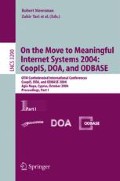Abstract
Adaptive process–aware information systems must be able to support ad–hoc changes of single process instances as well as schema modifications at the process type level and their propagation to a collection of related process instances. So far these two kinds of (dynamic) process changes have been mainly considered in an isolated fashion. Especially for long-running processes, however, it must be possible to adequately handle the interplay between type and instance changes as well. One challenge in this context is to determine whether concurrent process type and process instance changes have the same or overlapping effects on the original process schema or not. Information about the degree of overlap is needed, for example, to determine whether and – if yes – how a process type change can be propagated to individually modified process instances as well. This paper provides a formal framework for dealing with overlapping and disjoint process changes and presents adequate migration strategies depending on the particular degree of overlap. In order to obtain a canonical representation of changes an algorithm is introduced which purges change logs from noisy information. Finally, a powerful proof-of-concept prototype exists.
This work was done within the research project “Change management in adaptive workflow systems”, which is funded by the German Research Community (DFG).
Access this chapter
Tax calculation will be finalised at checkout
Purchases are for personal use only
Preview
Unable to display preview. Download preview PDF.
References
v.d. Aalst, W., van Hee, K.: Workflow Management. MIT Press, Cambridge (2002)
v.d. Aalst, W., Basten, T.: Inheritance of workflows: An approach to tackling problems related to change. Theoret. Comp. Science 270, 125–203 (2002)
Casati, F., Ceri, S., Pernici, B., Pozzi, G.: Workflow evolution. Data and Knowledge Engineering 24, 211–238 (1998)
Ellis, C., Keddara, K., Rozenberg, G.: Dynamic change within workflow systems. In: Proc. COOCS 1995, Milpitas, CA, pp. 10–21 (1995)
Sadiq, S., Marjanovic, O., Orlowska, M.: Managing change and time in dynamic workflow processes. IJCIS 9, 93–116 (2000)
Reichert, M., Dadam, P.: ADEPT flex - supporting dynamic changes of workflows without losing control. JIIS 10, 93–129 (1998)
Weske, M.: Formal foundation and conceptual design of dynamic adaptations in a workflow management system. In: Proc. HICSS-34 (2001)
Rinderle, S., Reichert, M., Dadam, P.: On dealing with structural conflicts between process type and instance changes. In: Desel, J., Pernici, B., Weske, M. (eds.) BPM 2004. LNCS, vol. 3080, Springer, Heidelberg (2004)
Reichert, M., Rinderle, S., Dadam, P.: On the common support of workflow type and instance changes under correctness constraints. In: Meersman, R., Tari, Z., Schmidt, D.C. (eds.) CoopIS 2003, DOA 2003, and ODBASE 2003. LNCS, vol. 2888, pp. 407–425. Springer, Heidelberg (2003)
Rinderle, S., Reichert, M., Dadam, P.: Correctness criteria for dynamic changes in workflow systems – a survey. Data and Knowledge Engineering, Special Issue on Advances in Business Process Management 50, 9–34 (2004)
Kochut, K., Arnold, J., Sheth, A., Miller, J., Kraemer, E., Arpinar, B., Cardoso, J.: IntelliGEN: A distributed workflow system for discovering protein-protein interactions. Distributed and Parallel Databases 13, 43–72 (2003)
v.d. Aalst, W., Basten, T.: Identifying commonalities and differences in object life cycles using behavorial inheritance. In: Proc. ICATPN 2001, Newcastle, UK, pp. 32–52 (2001)
Kiepuszewski, B.: Expressiveness and Suitability of Languages for Control Flow Modelling in Workflows. PhD thesis, Queensland University of Technology, Brisbane (2002), available via http://www.tm.tue.nl/it/research/patterns
Rinderle, S., Reichert, M., Dadam, P.: Flexible support of team processes by adaptive workflow systems. Distributed and Parallel Databases 16, 91–116 (2004)
Rinderle, S., Reichert, M., Dadam, P.: On dealing with semantically conflicting business process changes. Technical Report UIB-2003-04, University of Ulm (2003)
Guth, V., Oberweis, A.: Delta analysis of petri net based models for business processes. In: Proc. Applied Informatics, pp. 23–32 (1997)
Rinderle, S.: Schema Evolutio. In: Process Management Systems. PhD thesis, University of Ulm (2004) (to appear)
Badrinath, B., Ramamritham, K.: Semantics-based concurrency control: Beyond commutativity. ACM Transactions on Database Systems 17, 163–199 (1992)
Wäsch, J., Klas, W.: History merging as a mechanism for concurrency control in cooperative environments. In: Proc. RIDE 1996, New Orleans, pp. 76–85 (1996)
Basten, T.: Branching bisimilarity is an equivalence indeed! Information Processing Letters 58, 141–147 (1996)
Verbeek, E.: Verification of WF–Nets. PhD thesis, Technical University of Eindhoven (2004)
v. Glabbeek, R., Goltz, U.: Refinement of actions and equivalence notions for concurrent systems. Acta Informatica 37, 229–327 (2001)
Frank, H., Eder, J.: Equivalence transformations on statecharts. In: Proc. SEKE 2000, Chicago, pp. 150–158 (2000)
Author information
Authors and Affiliations
Editor information
Editors and Affiliations
Rights and permissions
Copyright information
© 2004 Springer-Verlag Berlin Heidelberg
About this paper
Cite this paper
Rinderle, S., Reichert, M., Dadam, P. (2004). Disjoint and Overlapping Process Changes: Challenges, Solutions, Applications. In: Meersman, R., Tari, Z. (eds) On the Move to Meaningful Internet Systems 2004: CoopIS, DOA, and ODBASE. OTM 2004. Lecture Notes in Computer Science, vol 3290. Springer, Berlin, Heidelberg. https://doi.org/10.1007/978-3-540-30468-5_9
Download citation
DOI: https://doi.org/10.1007/978-3-540-30468-5_9
Publisher Name: Springer, Berlin, Heidelberg
Print ISBN: 978-3-540-23663-4
Online ISBN: 978-3-540-30468-5
eBook Packages: Springer Book Archive

